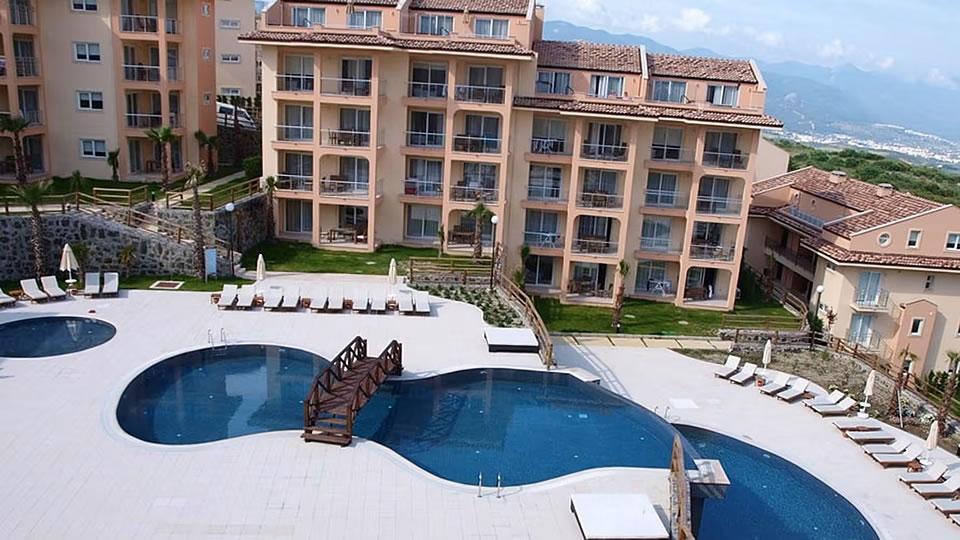CLC World sent their entire database of members an unapologetic email on January 10th 2024, informing them that two entire resorts in Turkey have been removed from their inventory portfolio with immediate effect.
The blunt missive informs readers that both the Kusadasi International Golf Resort (KIGR) and the Apollonium Spa and Beach Resort (ASBR) are no longer available for CLC members to book or exchange into.

New Turkish legislation is being blamed by CLC World for:“the closure of all our hospitality operations in Kusadasi along with significant redundancies.”
KIGR has around 400 rooms and ASBR a further 120, totalling approximately 520 units that are no longer available to CLC members trying to book their annual holiday.
This represents a staggering 26,000 vacation weeks being removed from the annual inventory available to long suffering CLC members. Members whose major complaint on review sites and social media is already lack of availability at resorts they have paid good money to holiday in.

“Both Kusadasi and Apollonium had dedicated guests who returned year after year,” says Greg Wilson, a CLC expert working for European Consumer Claims (ECC). “Many of these people will now be looking to book into other CLC resorts, further increasing pressure on an already buckling system.”
“Hundreds of people also bought freehold in these resorts,” continues Wilson. “They were sold on the promise of guaranteed holiday rental income from those properties. This is income that they will now no longer earn.
“The CLC freehold owners in question paid up to €250,000 each for their apartments. Without the rental returns they were guaranteed, and taking into consideration the catastrophic crash in the value of the Lira, those apartments are probably worth 75% less today than the amount the owners paid for them.”
The Turkish legislation that CLC World gives as the reason for cancelling their operations at Kusadasi Golf and Apollonium is known colloquially as the ‘Airbnb law. The law states that 100% of owners within the floor of a building must agree to short term holiday rentals in a complex. Without this agreement, owners may not rent their units to tourists.
The CLC World email however does not mention that only the owners on any given floor need to agree to short term rentals on their own floor (something which should be manageable in a resort mainly controlled by CLC World).
Instead it tells members:“100% of a (whole) complex must vote in favour of it being used for short term touristic purposes.”
The CLC email’s interpretation would mean it was almost impossible for owners to rent our their properties as holiday lets.
“This obvious discrepancy between the actual law, and the CLC email explanation seems telling,” says Andrew Cooper, CEO of ECC. “If you only need residents on any particular floor to be in agreement, then that seems like an achievable goal for at least parts of both complexes.
“There are over 70 timeshare resorts in Turkey who logically must be facing this same issue. Yet we are only hearing about resort closures from one company.”
“CLC seem to have given up on their two Turkish resorts suspiciously easily.”

The email makes disconcertingly vague promises to their members of “doing everything we can” and remaining “committed to delivering holidays.”
It fuzzily promises that CLC will “be in touch again as soon as we have further definitive options.”
CLC world’s legal difficulties are widely known. The company have been found liable in court for tens of millions of pounds worth of compensation because of decades of illegal sales practices.
Since late 2020, CLC have been engaging various tactics to avoid paying this legally mandated compensation, including putting many of their associated companies through administration and liquidation.
They have even removed much of their branding on favour of new partners Wyndham, renaming resorts and swapping out their decades-old signage.

The ease with which CLC seems to be giving up this inventory has many industry observers wondering if the beleaguered company are seizing this as yet another opportunity to scale down and avoid their financial responsibilities.
“CLC can’t be blamed for a change in Turkish law,” notes Suzanne Stojanovic, spokesperson for Timeshare Advice Centre (the marketing arm of ECC). “But if, one were cynical, the apparent swiftness with which they seem to have accepted the situation, and apathetic tone of the email regarding solutions for members could be interpreted as the company being secretly grateful for the opportunity this has presented them.
“This is a company intent on removing their identity whilst putting a succession of its ‘sub companies’ into administration, and suddenly, through no fault of their own, yet more of their responsibilities have been divested. It might be convenient for CLC’s plans, but it certainly isn’t good for their owners.”
Club La Costa’s chairman Roy Peires’s well publicised email to members last year boasted of multiple expensive new projects the company is investing in. An overt demonstration of corporate financial liquidity.
If you are a CLC member who feels like they got a poor deal, were mis-sold, or that the company is not living up to their original promises at the point of sale: get in touch with our team to explore your options regarding financial compensation and/or relinquishment.
